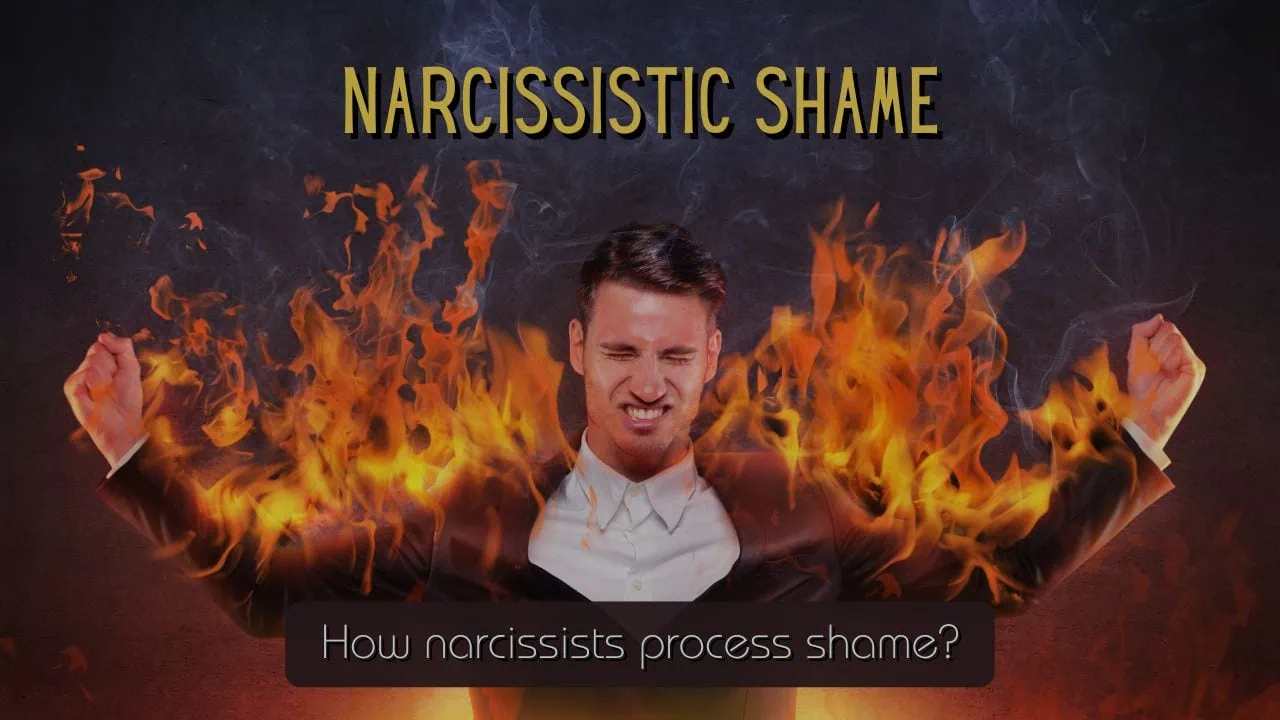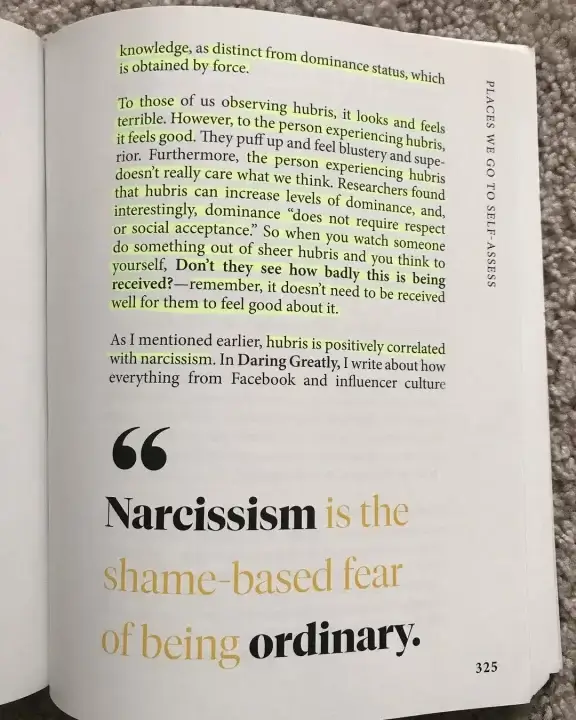Today's Monday • 12 mins read
Narcissistic shame is not just an embarrassment. It is a deep cut into their sense of honor, a reduction of self-worth, and a degradation of their social standing.
It is a narcissist’s moment of mortification (from Latin root mortificare).
To understand it, remind yourself that narcissism is a personality disorder characterized by a grandiose sense of self-importance, a lack of empathy, and a need for praise.
Narcissists believe they are superior and have the first right to special treatment in any situation, and this is where their problem starts.
How is shame different from guilt?
- Guilt is a feeling of remorse or regret associated with a specific act that you did or did not do. A guilt-ridden person may say, “I shouldn’t have done that.”
- Shame is a more general feeling of worthlessness or inadequacy. A shameful person may say, “I’m good for nothing.”
Narcissists are more prone to experiencing shame and very less of guilt.
What Is Narcissistic Shame?
Narcissistic shame defines a particular type of shame experienced by people with narcissistic tendencies.
Narcissists feel deeply embarrassed by their inadequacies, flaws, and averageness. They recognize their low self-worth, and put on a show of power and superiority to hide it from others around them.
In a strange twist, a narcissist will often shame you to hide their shame from you.
Why Do Narcissists Feel Shame?
Narcissistic shame can be triggered by things such as:
- Failure or rejection: A public failure or social rejection can easily hurt a narcissist’s sense of self-worth, and evoke feelings of shame, humiliation, and worthlessness. This potent shame can then lead to several destructive and even self-injurious behaviors.
- Criticism or disapproval: Narcissists are hypersensitive to criticism and disapproval, and often interpret even gentle feedback as personal battery. This can trigger feelings of humiliation, anger, and defensiveness, further reinforcing their shame.
- Not made to feel special or unique: Narcissists usually harbor a grandiose sense of self-importance. If they sense they are not being perceived as special or unique, it may trigger feelings of shame. This, in turn, can lead to a deep sense of inadequacy, inferiority, and worthlessness, fueling their cycle of shame-driven behaviors.

How Do Narcissists Process Shame?
When narcissists experience shame, they mostly react with a silent rage or a silent retreat.
- Social isolation: This is the silent retreat. They start to avoid social situations. Inside, they are likely afraid of being further exposed or criticized, or they may be plotting revenge. Going into solitude shields their fragile self-image. It may sometimes lead to prolonged social isolation and loneliness.
- Defensiveness: This most likely results in silent rage. But some narcissists may become openly and vociferously aggressive, lashing out with narcissistic rage.
- Blame-Shifting: The shamed narcissist will try to find a scapegoat to shift the blame for their mistake or misdeed. Blaming others and not taking responsibility for the wrong things (while claiming credit for the great things) is their very nature.
- Depression: In extreme cases, narcissistic shame can lead to depression or related mental health issues, especially with covert narcissists.
- Self-destructive behavior: Some shamed narcissists may engage in self-destructive behaviors, such as substance misuse, self-injury, or risky intimacy behavior, as a faulty coping mechanism.

Is Narcissistic Shame The Root Cause of Unhealthy Self-Love?
Both non-clinical and pathological narcissists have a high sensitivity to shame, which may be the source of their unhealthy self-centeredness.
Research reveals that the tendency to suffer intense feelings of shame is a key clinical sign of narcissistic vulnerability (Dickinson and Pincus, 2003).
Researchers think that shame is a prominent feature of NPD (Ritter & Vater, 2014), and that narcissism is “the most shame-based of all disorders” (Brené Brown, 2020).
Shame in general can be of two types: explicit and implicit.
- Explicit shame is a conscious, deliberate emotional response to negative self-evaluations. Narcissists feel explicit shame when they perceive themselves to have failed or fallen short of their own or others’ expectations.
- Implicit shame is an automatic and possibly unconscious emotional reaction, a result of learned behavior. Narcissists feel implicit shame in response to subconscious triggers, resulting from their inherent insecurity about their worth.
Both types of shame can make a narcissist react defensively, such as narcissistic projection, denial, or even hostile behavior, as they try to protect their self-image.
Let me explain now why narcissistic shame lies at the root of narcissism.
A narcissist always carries the shame of being mediocre and average. They are painfully aware of their flaws, failures, and inadequacies, and the resulting low self-worth. But they hide it well by putting on a mask of power and superiority.
They are also constantly fearful that someone will pull off that superiority mask and reveal their weakness and worthlessness.
The grandiose self-image they passionately cling to is rooted in their fear of being exposed and shamed at any moment. Loving this “heroic” self-image helps them disengage from their “shame-based fear of being ordinary.”
So, narcissistic shame may indeed be the root of the unhealthy self-love in narcissists.
Types of Narcissistic Shame
According to Vaknin, 2021, there are two types of shame that narcissists experience: narcissistic shame and self-related shame.
- Narcissistic shame: It is the narcissist’s experience of the Grandiosity Gap (and its affective correlate). The Grandiosity Gap is the difference between the narcissist’s grandiose self-image and the reality of who they are. This gap can lead to feelings of worthlessness, invisibility, and ridiculousness. Narcissists often try to defend against these feelings of shame by engaging in addictive, reckless, or impulsive behaviors, denying their flaws, withdrawing from others, or raging at them.
- Self-related shame: It is a result of the gap between the narcissist’s grandiose Ego Ideal and their Self or Ego. The Ego Ideal is the narcissist’s idealized image of themselves, while the Self is their actual, flawed self. The gap between these two can lead to feelings of shame, inadequacy, and unworthiness. Narcissists often try to defend against these feelings of shame by engaging in the same types of behaviors as they do to defend against narcissistic shame.
Related Posts:
What is Narcissistic Shame Core: Origins of Narcissistic Shame
Narcissistic shame is a deeply rooted feeling of inadequacy and self-loathing that stems from childhood experiences. It is a core feature of narcissistic personality disorder and is often the driving force behind a narcissist’s behavior.
Narcissistic shame is different from regular shame in that it is not a result of violating social norms or moral codes, but rather a deep-seated feeling of unworthiness that is often rooted in childhood experiences.
Many experts believe that childhood experiences play a significant role in the development of narcissistic shame.

Children who grow up in environments where they are constantly criticized or belittled by their parents are more likely to develop feelings of shame and inadequacy.
These experiences can lead to a distorted sense of self and a need for constant validation and attention.
Narcissistic parents can also contribute to the development of narcissistic shame in their children.
Narcissistic parents are often focused on their own needs and desires, and they may use their children as a means of fulfilling their own emotional needs. This can lead to a sense of emotional neglect in the child, which can contribute to feelings of shame and unworthiness.
The environment in which a child grows up can also play a significant role in the development of narcissistic shame.
Children who grow up in environments where there is a lot of pressure to succeed or where there is a focus on external validation may be more prone to developing narcissistic shame.
Narcissistic Personality Disorder (NPD) and Shame
As research shows, shame is a key emotion in Narcissistic Personality Disorder (NPD).
Grandiose and vulnerable narcissists both struggle with intense shame and self-doubt.
However, they react to shame triggers in different ways. Grandiose ones more likely react with anger and rage, while vulnerable narcissists tend to respond with sadness, anxiety, and withdrawal.
| Type of Narcissist | Reaction to Shame Triggers |
|---|---|
| Grandiose Narcissist | Anger, rage, defensiveness |
| Vulnerable Narcissist | Sadness, anxiety, withdrawal |
There are no pure grandiose or vulnerable narcissists.
The official guide for diagnosing mental disorders, the DSM-5, describes narcissistic personality disorder (NPD) mainly as a feeling of being grand.
But studies show people with NPD often display a strange mix of feeling superior and feeling vulnerable (Dickinson and Pincus, 2003, Pincus and Lukowitsky, 2010).
Narcissistic Behavior and Shame
Shame and inadequacy lie deep at the heart of narcissistic behavior.
Narcissists use an overblown sense of self-importance to hide their insecurity and mediocrity.
Narcissists react strongly when they feel threatened or criticized. They might blame others, show anger, or try to control the situation, driven by an unbearable sense of shame that chips away at their self-worth. While guilt is also a struggle, they often push it onto others rather than accepting blame.
Narcissists put up a strong front of being unshakeable. But when their bloated self-image breaks or high expectations aren’t met, the shame becomes hard to hide.
Feeling others are doing better can spark envy, deepening the shame they feel.
Lack of empathy is a notable trait in narcissists. They have trouble understanding or accepting others’ feelings. This can lead to hurtful behavior, which adds to their shame, as they fail to match up to their ideal self-image.
Narcissistic Shame in Relationships
Narcissistic shame in relationships can be a significant problem. Here’s how:
- Narcissists struggle with empathy, unable to understand others’ feelings. This makes their relationships shallow and dispute-ridden.
- They usually feel they’re better than others. This makes them blame or look down on their partners.
- They find it hard to accept when they’re wrong. This may make them act out or ignore their partner’s feelings.
- Narcissists often feel shame. This makes them feel not good enough or like they’ve failed.
- When they feel shame, they might become defensive, get mad, or pull away. This behavior can make their relationships toxic. They might make their partners feel guilty or not good enough.
- They might also see their partner as weak. This can hurt communication and closeness in the relationship.
- Therapy can help narcissists learn ways to control their shame-based reactions and build better relationships.
How Narcissistic Shame Affects The Person And Others
This is how shame affects the narcissist:
- Narcissistic shame is a painful emotion that can often cause physical pain and physical symptoms.
- They may also be suffering from a hidden, deep-seated sense of fear, anxiety, PTSD, or depression.
- They can become obsessed with perfection and high status. This can make them overwork and cut back on sleep.
- They may struggle with self-esteem issues and constantly demand attention and validation from people around them.
- They may also start avoiding responsibility given to them at work or home.
- They may talk less in groups and in one-to-one interactions.
Narcissistic shame can also affect those around them:
- They can lash out at others — family, friends, colleagues.
- They may take to trolling innocent people on social media.
- They can strike up fights with strangers like waiters and air hostesses.
Coping with Narcissistic Shame
Narcissistic shame can be a difficult emotion to cope with. Here are some ways:
- Empathy. Learning to care about the feelings of others is an important aspect of coping with shame, so that shaming incidents are rare. Narcissistic people have low empathy, but empathy is a learnable skill. So, they can learn to put themselves in others’ shoes and develop a less judgmental and less critical view of others.
- Forgiveness and Repair. They may recognize that asking for forgiveness does not reduce their self-worth or social value. They can learn to ask for forgiveness, and seek ways to repair any harm they did.
- Interpersonal Adjustment. They may learn a more non-disputeing and more adjusting sense of interaction with others. They can train themselves on active listening skills.
- Generosity and Purpose. They can learn to be more charitable and generous, and find their greater purpose in life that goes beyond their self-serving ego.
- Boundary Setting. They could learn to say “No” to requests that feel overwhelming or triggering, as well as set limits on the amount of time spent in emotionally taxing situations.
- Therapy. A therapist can help them fully explore their feelings of shame, and develop strategies to manage them. This may involve learning to identify and challenge negative self-talk, setting boundaries with others to avoid triggers, and practicing self-compassion.
Treatment For Narcissistic Shame
The main goal of treatment is to train the narcissist to maintain control over their self-serving attitude, their toxic actions and reactions, and their acceptance of others without judgment.
Narcissistic people are often resistant to treatment because they don’t like to open up about their vulnerability for fear of being exposed.
Some hurdles to treating narcissists:
- Exploring Vulnerabilities: The narcissist may not be able to fully explore the root causes of their shame and vulnerability.
- Emotional Regulation Techniques: The narcissist may view these techniques as a means of suppressing their “natural” emotional responses.
- Awareness of Vulnerabilities: The narcissist might view opening up their vulnerabilities as a tactic to make them more dependent on the therapist and more susceptible to manipulation.
- Long-Term Therapy: Treatment for narcissistic shame can be a long-term process. This could be seen by them as an opportunity for the therapist to maintain control over the patient and extract more resources (e.g., time, money, emotional investment) from them.
Cognitive-behavioral therapy, mindfulness meditation, and relaxation techniques are often used.
√ Also Read: What Happens When A Narcissist Knows You Love Him/Her
√ Please spread the word if you found this helpful.
» You deserve happiness! Choosing therapy could be your best decision.
...
• Disclosure: Buying via our links earns us a small commission.

